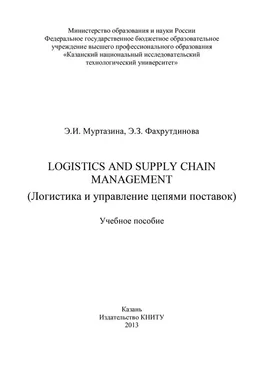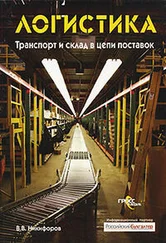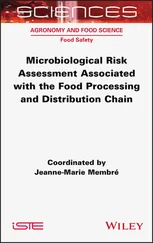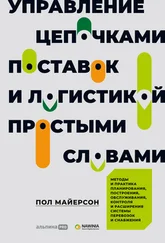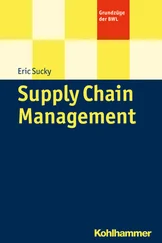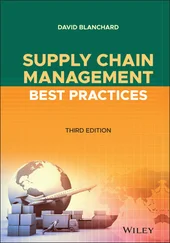6. Европейская комиссия провела в Брюсселе ряд рабочих встреч-консультаций по вопросам радиочастотной идентификации.
7. Использование RFID-меток вызвало серьёзную полемику и критику.
8. В Евросоюзе полагают, что использование радиочастотных меток будет расти в последующие годы – необходимо проводить общественные дискуссии относительно того, как целесообразно использовать и защищать данные, которые предоставляют эти метки.
13 . Use past simple or present perfect forms of the verbs given in brackets (See Language Notes):
1. Yesterday they ......... 1(transfer) of structured data from one computer system to another.
2. Recently we ....... 2(work) out a Continuous Replenishment Program.
3. Last year the company ......... 3(implement) Advanced Order Management.
4. Since 2005 Enterprise Resource Planning ...... 4(use) at the factory.
5. RFID already ...... 5(cause) a fair degree of controversy and ....... 6(prompt) campaigns by privacy groups.
6. Move to a true Just-In-Time strategy ...... 7(change) the attitude: “We are doing alright, don’t risk it” ..... 8(replace) “What we need to do and how do we make it happen”?
7. You ever ..... 9(check) the stock-keeping unit?
8. The warehouse management system ......... 10(implement) 3 months ago… 11(help) the employees work effectively on all stages.
9. Collaborative Planning and Forecasting Replenishment ..... 12(improve) the work of logistics provider.
10. Our project already..... 13(create) a network of sensors deployed at sites in the vicinity of applications that rely on the GPS signal.
11. We never ..... 14(use) total quality management. Why shouldn’t we try?
14 . Retell the article “Why the EU is worried about RFID” according to the plan:
A. The radio tags have prompted campaigns by privacy groups, street demonstrations in Europe, and conspiracy theories.
B. European Commission held a series of workshops in Brussels as part of a consultation over the technology.
C. Most business cases for RFID don’t involve the consumer, but are based around back-end systems and the logistics chain.
D. Work on privacy and security enhancement measures for RFID.
E. Collecting information in a digital form and in the form of RFID tags.
SITUATION PRACTICE
15 . Make the dialogue about the necessity of using RFID-tags.
Useful language: Asking for opinions, making suggestions (see Unit 1)
UNIT 4
LOGISTICS SERVICE PROVIDER
1 . Read the following international words. Define their meanings comparing them to the meanings of the corresponding Russian words:
category, complex, distributor, information, logistics, operational, physical, role, service, sub-contracted, terminology.
2 . Complete the table using suitable forms:

3 . Translate English words and phrases in column A using Russian words and phrases from column B:
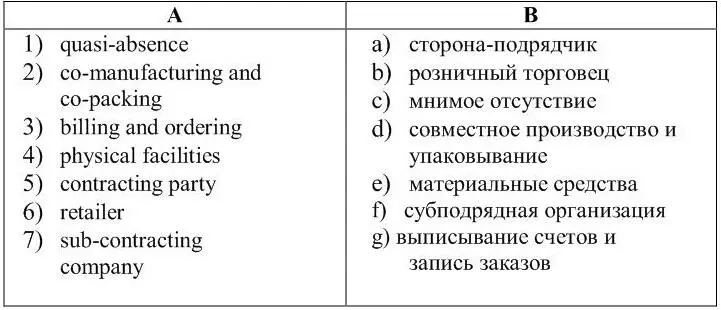
1 . Observe the words and phrases from the text “Logistics Service Provider”:

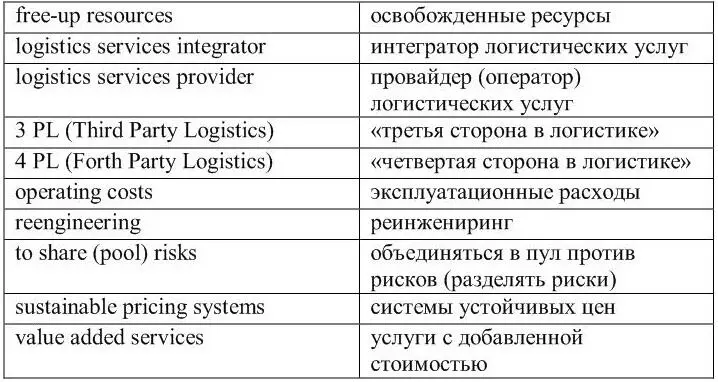
5 . Read and translate the text:
Logistics Service Provider
Logistics service provider is a company performing logistics activities on behalf 8 8 зд. от лица
of a manufacturer or distributor. Depending on the complexity and the type of value-added operations carried out by the Logistics Service Provider, such categories can be defined:
The traditional logistics service providerscarry out physical logistics operations (order processing and picking, transport and storage) and whose management system is limited to tracking shipments on behalf of the client company;
Value added service providersadd a certain number of services to the traditional package ranging from managing complex operational handling (co-manufacturing and co-packing), to management of administrative operations (billing and ordering) and information management (trackingtracing, etc.) These two categories refer to Third Party Logistics (3PL). The manufactures use outside sources attracting outside specialist suppliers of transport or distribution/logistics services, usually under contract (e.g. transport/ warehousing or full-scale logistics service) replacing in-house facilities.
Benefits of Outsourcing:
• Improve company focus
• Access to world-class capabilities and new technology
• Accelerated reengineering benefits
• Share (pool) risks
• Free-up resources
• Cash infusion
• Reduce and control operating costs
• Resources not available internally
• Eliminate labor problems
Challenges of 3PL are:
• Development of appropriate and sustainable pricing systems
• Finding qualified people
• Development of systems which are flexible, adoptable and user-friendly
• Development of a global logistics infrastructure.
The third category: Logistics services integratorscharacterized by the quasi-absence of their own physical facilities. Their role is to integrate the services of different subcontracting companies (transport, storage, valueadded operations, etc.) and to coordinate and control them through management of the associated information flows.
Whereas a third party logistics (3PL) service provider targets a function, a 4PL targets management of the entire process. Some have described a 4PL as a general contractor who manages other 3PLs, truckers, forwarders, custom house agents and others, essentially taking responsibility of a complete process for the customer. The concept 4PL provider was first defined by Andersen Consulting (Now Accenture).
2 . Give English equivalents for the words and phrases given below. Make up your own sentences with these words and phrases:
вливание капитала; восполнение; выписывание счетов; запись заказов; физические логистические операции; мнимое отсутствие; облегчать; розничный торговец; сторона-подрядчик; совместное производство и упаковка; склад; субподрядная организация.
7 . Complete sentences using words and expressions given below:
managing; ordering; shipments; type; operating; contractors; third; comanufacturing; sharing; problems; forwarding; value-added; service.
1. Depending on the complexity and the ......... 1of ............ 2operations there are several categories of the logistics service provider.
2. The management system of the traditional logistics ...... 3providers is limited to tracking ........... 4on behalf of the client company;
Читать дальше
Конец ознакомительного отрывка
Купить книгу
